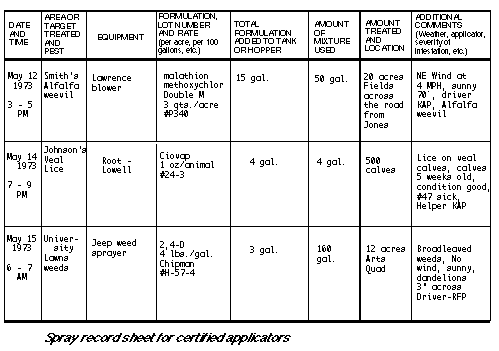Record Keeping

Record Keeping
Besides just meeting the requirements, keeping records of pesticide usage
is a wise precaution. Records can establish proof of proper use or they are
helpful in finding the cause of error, if an error is made. They can also
provide information to trace residue and /or damage problems. Records can also
save you money. They allow you to compare the results obtained from different
pesticides . You can improve your pest control practices and efficiency too.
They also help to reduce pesticide misuse. Careful records from year to year
guide you in buying only the amount of pesticides you will need. Therefore, you
can reduce winter carryover.

 Would you like to try a study question?
Would you like to try a study question?
Goals of This Chapter
- Learn how pesticide application records can be helpful to you.
- Know when and how to fill out record sheets.
- Understand the importance of standard forms.
What Are the Requirements?
The more information you keep on record, the more useful the records will be to
you. Carry a notebook with you in the field. All the information is right there
in front of you. Do not try to memorize all the necessary items. Fill in a
standard form to be sure that you get all the necessary data every time.
 Would you like to try a study question?
Would you like to try a study question?
 Would you like to try a study question?
Would you like to try a study question?
Information Needed
- Time of day and date of application
- Crop or target
- Pest
- Equipment used
- Pesticide used
- Common name
- Trade name
- Formulation and % active ingredient
- Lot number (in case of cross-contamination or failure to control)
- Total formulation added to tank or hopper
- Amount of mixture used
- Amount or numbers treated (acres, trees, sheep, etc.)
- Additional comments
- Location
- Weather
- Applicator
- Severity of infestation
On every record form there should be a space left for additional comments.
This space should be used to jot down information for your own personal use.
This information can be used to improve your business, either through better
customer relations or by saving you money. Such records can also be helpful in
liability cases.
 Would you like to try a study question?
Would you like to try a study question?
Remember, the job is never finished until the paper work is done.
Back to Top